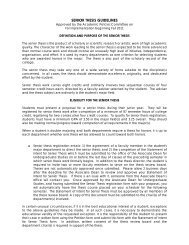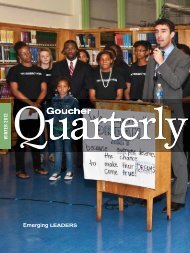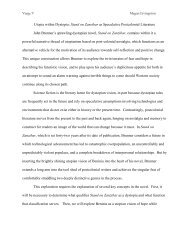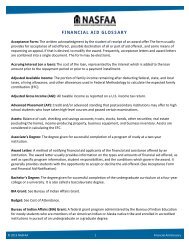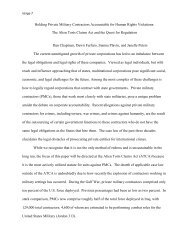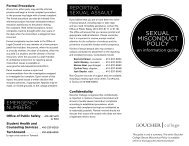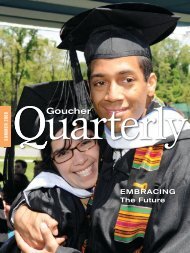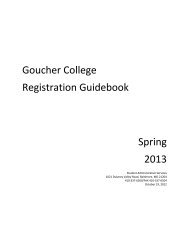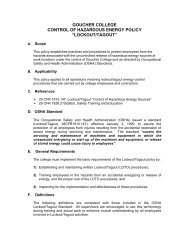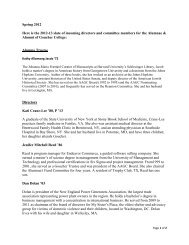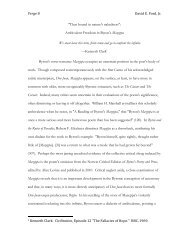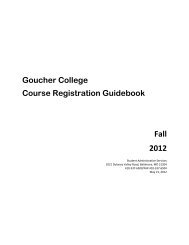Abraham Lincoln and the Northern Anti-War Press
Abraham Lincoln and the Northern Anti-War Press
Abraham Lincoln and the Northern Anti-War Press
You also want an ePaper? Increase the reach of your titles
YUMPU automatically turns print PDFs into web optimized ePapers that Google loves.
Verge 6 Wer<strong>the</strong>imer 3<br />
Thoroughly embarrassed, he was made to repeat a lengthy apology in front of <strong>the</strong> crowd: “I am<br />
sorry that I have published what I have, <strong>and</strong> I promise that I will never again write or publish<br />
articles against <strong>the</strong> North <strong>and</strong> in favor of secession, so help me God” (Sprague 135).<br />
The violence continued through <strong>the</strong> end of August, <strong>and</strong> a breaking point was reached<br />
when prominent newspapers in New York City were threatened with violence. Publications that<br />
supported <strong>Lincoln</strong> <strong>and</strong> his war called for an end to <strong>the</strong> mob violence, but not because of <strong>the</strong>ir<br />
support for <strong>the</strong> freedom of <strong>the</strong> press. Instead, <strong>the</strong>se papers called on <strong>the</strong> federal government to<br />
suppress anti-war sentiment ra<strong>the</strong>r than <strong>the</strong> public. The New York Times stated this view<br />
explicitly: “If <strong>the</strong>se newspapers are to be suppressed, let it be done by virtue of public law, <strong>and</strong><br />
not by reckless violence…If <strong>the</strong>ir continued existence puts <strong>the</strong> Government in peril, let it be<br />
arrested; but let it be done by <strong>the</strong> law <strong>and</strong> its agents <strong>and</strong> not by a mob” (Sprague 140).<br />
The <strong>Lincoln</strong> administration‟s response would undoubtedly be highly consequential. On<br />
<strong>the</strong> one h<strong>and</strong>, if it did nothing, <strong>the</strong> violence would continue <strong>and</strong> likely intensify. Any attempt by<br />
<strong>the</strong> administration to protect publishers <strong>and</strong> allow <strong>the</strong>m to publish <strong>the</strong>ir critical editorials would<br />
be massively unpopular, <strong>and</strong> <strong>the</strong> government would lose <strong>the</strong> backing of its strongest supporters.<br />
However, if it followed <strong>the</strong> advice of <strong>the</strong> NY Times <strong>and</strong> dealt with Nor<strong>the</strong>rn dissent, <strong>the</strong> <strong>Lincoln</strong><br />
administration would need to take extraordinary measures that were <strong>the</strong>n unprecedented in<br />
American history. As Dean Sprague explains in his book Freedom Under <strong>Lincoln</strong>, “any action by<br />
<strong>the</strong> federal government [to suppress anti-war sentiment] would require a radical readjustment in<br />
<strong>the</strong> balance of power between <strong>the</strong> states <strong>and</strong> <strong>the</strong> federal government” (Sprague 140).<br />
The <strong>Lincoln</strong> administration began its campaign against critical newspapers in New York<br />
City, where <strong>the</strong> largest paper in <strong>the</strong> city, <strong>the</strong> Journal of Commerce, as well as <strong>the</strong> New York Daily<br />
News, both distributed <strong>the</strong>ir anti-war articles to newspapers across <strong>the</strong> country to be reprinted.



